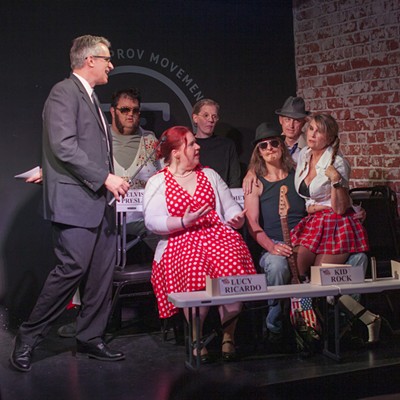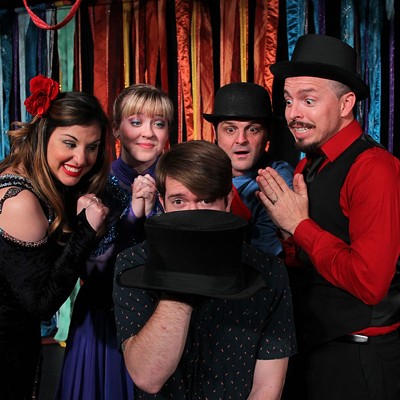Too much. Too little. Too long.
It may sound contradictory, but it's an accurate description of Taking Steps, currently running at Live Theatre Workshop.
English playwright Alan Ayckbourn's comedy takes a clever staging convention and exploits it to the max to tell the story of a silly bunch of people who get caught up in a story which often makes one smile, sporadically makes one laugh, and occasionally inspires one to look at one's watch.
Director Kristi Loera has whipped her actors into fine form as they tackle the idiosyncrasies of Ayckbourn's farce, so the production itself doesn't seem to be driving the watch-checking. It's the play itself, which is rather surprising, since Ayckbourn is a skillful farceur. There are a few missteps in LTW's go at it, but it is Ayckbourn's labored storytelling that strains our good humor.
Ayckbourn is known for his unique staging creations. In How the Other Half Loves, he combines settings for two different flats creatively patch-worked into one. The sofa is upholstered in two fabrics; half of a piece of furniture is one style, and the other half another. It's a bit confusing at first, but the opportunities for humor abound as we watch two households play out their stories at the same time, with what's going on for one merging with what's happening for the other.
In Taking Steps, Ayckbourn's trick is to put, on one single level, three stories of a large Victorian home. At times, there are activities on all three "stories," which not only provides a great opportunity for humor, but allows the audience to be aware of things that the characters are not. We figure out pretty quickly what's going on, especially as the characters give us funny cues, running up and down invisible steps.
The story itself is pretty much an excuse to show off the clever staging. Some of the characters are vapid and boring, and they exist quite obviously only to connect the dots of Ayckbourn's convoluted piece. It seems he wants his play to be a clever puzzle, but he forgot that for this to work, a playwright needs to create interesting and credible characters that we might give a hoot about, even though they may really be pawns in his game.
Please note that I'm saying "characters," not actors. Although some of the actors here can't quite come up with characters that win our interest—and laughs—frankly, they're not given a whole lot to work with. In a situation like this, an actor is called on to exercise a marathon of creativity. It's not easy, but it is possible with the right folks.
The inexorable first scene is none too funny. Yes, we understand it exists to set up our story, but it is played out so lazily that our attention and good will are taxed from the get-go. Note to playwright: It's probably not wise to try to reel an audience into your story with a vapid character conversing with a rather clueless sort who, it is plainly stated, is so boring that people are known to fall asleep when he talks. This is not exactly a rousing call to attention.
We understand from this scene, if we work hard to stay with it, that Elizabeth (Shanna Brock) is the trophy wife of the master of the house, a way-too-fond-of-alcohol wealthy bucket baron. The wife is a dancer (ahem), and she resents her lack of freedom in the marriage. So she is leaving, having written a farewell note which she hopes brother Mark (Travis Martin) will deliver. But Mark is awaiting the return of his one-time fiancée, Kitty (Amanda Gremel), who he has convinced to come back, even though she jilted him at the altar.
Meanwhile, lord-of-the-manor Roland (Michael Woodson), not knowing that his own beloved is bolting, is trying to decide whether to buy the drafty old home he has been leasing. Painfully tongue-tied solicitor Tristram Watson (Stephen Frankenfield) arrives, along with Mr. Bainbridge (Nicholas Gallardo), the owner of the home, who wants to unload the house ASAP. Alcohol, sleeping pills, characters trying to avoid others on the nonexistent stairs, people in the wrong beds and misinterpreted notes provide the comic engine of the evening.
But here's the thing: Ayckbourn takes so long to set things up that, by the time the play gets cracking, we feel that something to laugh about is way overdue. It's like riding a rollercoaster where the climb to the top takes ever-so long, and when you finally begin to pick up speed and start the spins and loops, it's all over much too soon. Was it worth that slow, laborious climb?
Woodson does a nice job as Roland, affable, duped and drugged. His characterization makes sense, and he lends himself graciously to the folderol to which he falls victim. Frankenfield, as the bumbling lawyer, is totally grounded, and thus convincing in his over-the-top stutters and sputters. But it's an extreme choice, and he almost pushes it to the point where it becomes tiresome. Gallardo's Bainbridge feels painfully false as he strains to be funny. Even with farce, less is often more.
And then there's poor Gremel as Kitty. Her character is there for logistical purposes only, but Gremel gamely allows herself to be the best big, blond, blank slate she can be.
So what we are left with is too little story populated with too-ill-developed characters; too much exposition with too little payoff; and a plot so dense that it takes way too long to play out.
Taking Steps is a bit of fun, and LTW's effort here is mostly well done. But in the end, it's just too much, too little and too long.










